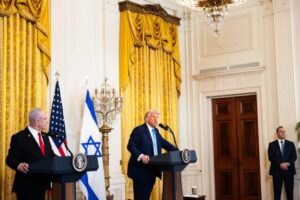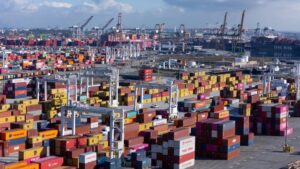
The National Interest Foundation Newsletter
Issue 272, February 7, 2025
Welcome to our NIF Newsletter. In this week’s edition, we delve into how the Gaza takeover proposal has sparked global and domestic repudiation, analyze the Trump administration’s efforts to shut down the United States Agency for International Development (USAID), and examine the impact of U.S. tariffs on the global market.
Editor: Bassam Tarbush
Gaza Takeover Proposal Sparks Global and Domestic Repudiation

The remarks promoting a U.S. takeover of Gaza and for Palestinians to be displaced were met with rebuke and outrage. (Photo from The New York Times)
President Trump has drawn both global and domestic condemnation for his recently unveiled Gaza takeover proposal, in which he suggested that the United States take “ownership” of the Gaza Strip and redevelop it while displaced Palestinians there be permanently resettled outside of the territory. Trump made the remarks at a joint press conference with Israeli Prime Minister Netanyahu, who is visiting the U.S. this week despite an existing International Criminal Court (ICC) arrest warrant against him for war crimes and grave human rights violations. The idea floated by Trump is problematic for a number of reasons. Firstly, the forced mass displacement of civilians from Gaza would amount to a severe violation of international law and a crime against humanity, with some observers equating it to ethnic cleansing. Additionally, it would be a further violation for the United States to permanently take over the territory of Gaza. Doing so would also serve to deeply embroil the U.S. in the Middle East – something that runs counter to Trump’s pledges to keep the nation out of foreign entanglements.
Countries in the Middle East and around the world reacted to Trump’s remarks on Gaza with sharp disapproval and rebuke. Saudi Arabia’s foreign ministry expressed that it rejected any attempts to displace the Palestinians from their land, while Egypt stressed the importance of moving forward with recovery projects in Gaza without Palestinians leaving the territory. Among some of the United States’ main allies in Europe, France reiterated its opposition to any forced displacement of Gaza’s Palestinian population, noting that it would constitute a serious violation of international law and be a source of major destabilization in the region. Germany emphasized that mass displacement would be a breach of international law, and pointed out that it would only serve to fuel animosity and worsen humanitarian suffering. A plethora of other nations in Europe and elsewhere including the United Kingdom, China, Turkey, Brazil, Ireland, and Spain issued strong-worded statements opposing the proposal put forth by Trump as well. Domestically within the United States, a bipartisan group of lawmakers also slammed the president’s comments. U.S. Senator Tim Kaine (D-VA), a member of the Foreign Relations Committee, called the idea “deranged” and highlighted that American military presence in the region would be “a magnet for trouble.” Furthermore, U.S. Representative Mike Quigley (D-IL) remarked that he was “appalled” by the proposal, and U.S. Senator Rand Paul (R-KY) criticized it saying “I thought we voted for America First…We have no business contemplating yet another occupation to doom our treasure and spill our soldiers’ blood.” U.S. Senator Thom Tillis (R-NC) added that “I don’t know under what circumstance it would make sense even,” while U.S. Senator Chris Van Hollen (D-MD) stated that “Trump’s proposal to push two million Palestinians out of Gaza and take ‘ownership’ by force, if necessary, is simply ethnic cleansing by another name.”
On top of President Trump’s controversial and outlandish Gaza takeover proposal, denunciation has also been aimed at Netanyahu’s visit itself to the United States this week. Understandably, rights groups and activists have been highly critical of this – the first trip by a foreign leader to the U.S. since Trump’s inauguration. Amnesty International lamented Netanyahu being welcomed to the White House and outlined how the U.S. is undermining international justice by hosting him amid the existing ICC arrest warrant that was issued back in late November. The group has previously deemed that the Israeli government is committing genocide by way of its military operations in Gaza. Under Netanyahu, Israel is facing a genocide case at the International Court of Justice (ICJ) as well for its conduct during the Gaza War. Other rights organizations have expressed that Netanyahu should be held accountable, not celebrated, and warned that Trump’s support of him diminishes peace efforts. Human rights attorneys have argued that the invitation of Netanyahu is not only disrespectful to Palestinians, but it is also evidence that Trump has no interest in the rule of law. The fact that the leader of the United States – a country founded on the ideals of justice and liberty – is inviting an individual charged with egregious crimes against humanity into the Oval Office is extremely troubling.
In addition to all of this, yesterday Trump signed an executive order imposing sanctions on the ICC over its investigations into Israel. The move has been met with condemnation from several U.S. allies, including Germany, the Netherlands, Canada, and France. The European Council and the United Nations also criticized the decision, emphasizing that the sanctions undermine the international criminal justice system and the court’s independence. Last month, the U.S. House of Representatives had voted to sanction the ICC, but the bill was blocked in the U.S. Senate. In response to Trump’s action, the ICC has stated that it is undeterred and has vowed to continue its impartial work.
The main agenda points for Trump’s meeting with Netanyahu was slated to include discussion on the ceasefire agreement in Gaza as negotiations take place regarding the second phase of the deal, the prospect of normalizing relations between Israel and Saudi Arabia, and the situation with Iran. It remains to be seen how Trump’s widely condemned remarks on Gaza potentially impact the already fragile ceasefire agreement in Gaza, particularly in the midst of negotiations on the second phase. Coming out of the meeting with Netanyahu, Trump stated that he would “restore a maximum pressure policy” on Iran that the White House says will be brought to fruition through economic sanctions. With respect to the prospect of a normalization deal between Israel and Saudi Arabia, the latter has consistently expressed that this is a nonstarter without concrete steps towards Palestinian statehood – a position that Saudi Arabia has said is “firm, steadfast, and unwavering.” Both Trump and Netanyahu have relayed a desire to bring Saudi Arabia into the fold on the Abraham Accords, even as the existing deals have been criticized for trying to sideline and ignore the issue of social justice for Palestinians – something that must be appropriately addressed in order to truly bring stability to the Middle East.
On Thursday of this week, President Trump reiterated his panned suggestion that Palestinians should be displaced from Gaza. This followed a Wednesday afternoon press conference in which White House Press Secretary Karoline Leavitt appeared to walk back some of Trump’s earlier statements, as she remarked that the proposal called for “a temporary resettlement of Palestinians.” Recently, news also broke that Israel’s defense minister had instructed the military to prepare a plan “to allow Palestinians to voluntarily leave the Gaza Strip” after officials embraced Trump’s widely condemned Gaza takeover proposal.
Trump Administration’s Efforts to Shut Down USAID

Various lawmakers have pointed out that any attempts to change the structure of the agency require the consent of Congress. (Photo from Getty Images)
Tech billionaire Elon Musk, whom President Trump has made head of the newly-formed Department of Government Efficiency (DOGE), announced earlier this week that the administration is seeking to shut down the United States Agency for International Development (USAID). In the time since Trump’s inauguration, thousands of USAID employees have been laid off and many of its programs around the world halted, as the president has instituted a broad freeze on foreign assistance over accusations of wasteful spending. Administration officials have also discussed the possibility of placing USAID under the authority of the State Department, with Secretary of State Marco Rubio tapping Pete Marocco, the director of foreign assistance there, to run USAID. Several lawmakers and legal experts have pushed back against the efforts to shut down or alter the agency, expressing that the attempted remake of the federal government is unlawful and requires the approval of Congress. A group of elected officials including U.S. Senator Chris Van Hollen (D-MD) and U.S. Representative Gerry Connolly (D-VA) held an event outside of USAID headquarters where they pledged to fight the dismantling of USAID on multiple fronts.
USAID is an agency of the U.S. government that is responsible for providing civilian foreign aid and development assistance, having been established in the early 1960s under the premise that American security was tied to stability and economic advancements in other countries. USAID’s programs cover billions of dollars in humanitarian aid overseas and focus on areas such as fighting disease and food insecurity, reducing poverty, and offering relief to those impacted by conflicts and natural disasters – most of which was upended after President Trump froze foreign assistance upon his return to the White House. As the Trump administration seeks to slash government spending, critics of the move highlight the lifesaving aid that has been hindered as a result. Many organizations that provide vital care for needy and vulnerable people around the world have been forced to halt operations, as they have been unable to secure waivers to continue their work uninterrupted. Additionally, the Trump administration’s efforts to shut down USAID have also elicited concern that the United States will lose its standing on the global stage and allow other countries to fill the void. Analysts have warned that the action could lead to the diminishing of American influence, especially in Asia, Africa, and South America – where USAID programs address a range of important needs. Others have stated that U.S. national security interests might be negatively affected as well, due to sudden changes to development programs risking instability in various places across the globe.
As some observers have sought to crucially draw attention to, the reason why there has been a significant degree of resistance and alarming concern regarding the efforts to shut down USAID is because much of its work is humanitarian in nature. While one can certainly levy fair criticism towards the exorbitant amount of foreign military aid given to countries like Ukraine and Israel, the purely humanitarian programs that provide food and medicine in other geographic locations should not be impeded. On the contrary, these should be protected and allowed to continue, and it is excessive foreign military spending mechanisms that instead warrant an overhaul and reduction. USAID operates as the world’s largest single donor of international food assistance, supports HIV/AIDS initiative programs like the United States President’s Emergency Plan For AIDS Relief (PEPFAR) that have saved more than 25 million lives, and funds education for schoolgirls in Afghanistan, among other things. Overall, the agency oversees humanitarian, development, and security programs in approximately 120 countries. The prospect of agency closure not only puts humanitarian aid at risk, but also threatens the jobs of Americans working abroad and here at home in the United States. Experts have noted that much of the money provided by USAID is helping foreign countries grow and develop stronger commercial ties with the U.S., and thus, shutting down the agency would – as one put it – “leave the door wide open for China to continue exerting its influence in Africa, jeopardizing American business interests and values.”
Trump administration officials have labelled USAID “a waste” and accused it of “advancing liberal social programs,” while supporters of the work that the agency does have argued that it plays a crucial role in disease prevention, counterterrorism, and humanitarian assistance globally. There appears to be a fair amount of bipartisan agreement regarding overspending on foreign-related issues, however, the general dissent along party lines is over whether USAID’s funds and policies should be autonomously controlled by the agency or subject to more government control. The majority of the American public agrees that the United States spends too much money on foreign aid, and as a result, too little on domestic affairs. In one of the latest developments this week related to the efforts to shut down USAID, the agency recently announced that thousands of employees would be placed on leave starting late Friday night, as personnel outside of the country – barring those given exceptions – would be recalled back from their postings within 30 days.
Impact of U.S. Tariffs on the Global Market

This week, Trump agreed to hold off on imposing tariffs against Mexico and Canada for a month, but his tariff on Chinese imports has come into effect. (Photo from Reuters)
Over this past weekend, President Trump had relayed his intent to impose a 25% tariff on goods from both North American neighbors of Mexico and Canada, in addition to one against China. This drew the attention of foreign leaders and the stock market, prompting a significant Monday dip as Wall Street braced for the impact of the steep new tariffs and many feared an imminent trade war which would have resulted in lower corporate profits and less consumer spending. The Canadian Dollar and the Mexican Peso each took a hit in value as well. However, Trump ultimately agreed to a month-long pause on the tariffs against Mexico and Canada, in return for border and crime concessions from the two. Trump’s announcement of this came after he stated that Mexican President Claudia Sheinbaum had agreed to send 10,000 soldiers to the border, and Canadian Prime Minister Justin Trudeau expressed the nation’s implementation of a $1.3 billion plan to reinforce its shared border with the United States. Prior to the agreed upon pause, the premier of Ontario had ordered the removal of all American alcohol from the shelves of the largest liquor wholesaler in the region. Other areas of Canada had also followed suit by no longer selling “red-state” alcohol and putting up signs that said “Buy Canada Instead.”
While these two planned tariffs against Mexico and Canada were put on hold after the countries’ respective leaders spoke to Trump, a 10% tariff on China did come to fruition on Tuesday. It is believed that China’s slow and limited reply to stop implementation, in conjunction with Trump’s indifference, contributed to the initiation of this. Unsurprisingly, this was met with retaliation from the Chinese government, which levied its own tariffs on American goods as well as restricting the exports of important minerals. Specifically, they imposed 15% tariffs on some coal and liquified natural gas, plus 10% tariffs on crude oil, agricultural machinery, large-displacement cars, and pickup trucks. The Chinese government also launched an antitrust investigation into Google, alleging that the company violated China’s “anti-monopoly,” and there are plans for an investigation into Apple’s policies and its App Store’s fees. Additionally, China decided to present a complaint to the World Trade Organization (WTO), accusing the U.S. of making “unfounded and false allegations” about its role in the fentanyl trade to try and justify tariffs on Chinese products. The issue of fentanyl is one of the main reasons that the Trump administration has used to defend its tariffs. Trump himself has explicitly stated that he introduced the tariffs “because of the major threat of illegal aliens and deadly drugs killing our citizens, including fentanyl.”
It is still unclear how the imposing of tariffs will have any effect on illegal immigration, as a correlation between the two has yet to be observed. The tariff ultimatum did lead to Mexican President Sheinbaum deploying 10,000 troops to the United States-Mexico border, however, as many experts have noted, the measures taken were already in place or likely could have been achieved without Trump’s ultimatums. The same goes for the actions taken on the United States-Canada border, where a new “fentanyl czar” will be put in place to supposedly combat the “major threat.” What is interesting about this is that many contend that it’s not really necessary. Canada plays almost no role in the fentanyl crisis, as only 43 pounds of fentanyl were confiscated from the U.S.-Canada border last year. For context, roughly 21,100 pounds were seized from America’s southern border during the same period of time. All that is to say that it would appear as though Trump is more interested in “winning” a trade war, instead of deploying good diplomacy and policy. It is unknown if Trump’s economic strategy would eventually become a trade war against America’s largest trading partners, or what exactly that might entail. What is known for certain is that tariffs are an inflationary measure that will increase the price of goods for consumers across the United States – hardly in line with what Trump said during his campaign when he promised to reduce inflation and bring down the cost of goods. Economists and business groups have warned that tariffs could raise prices for a wide range of products in the United States and trigger an economic slowdown.
Canada, China, and Mexico are not the only ones that face the threat of possible Trump tariffs. The European Union (EU) and India have tried to get ahead of potential American tariffs by calling for negotiations and cuts. India initiated a preemptive move by allowing Harley-Davidson bikes to enter the country more easily. The import of Harley-Davidson bikes accounts for roughly $3 million of revenue annually. It remains to be seen whether these tariff cuts will appease Trump enough to dissuade the prospective trade actions that could follow. With respect to the EU, Trump has said publicly that these tariffs were coming “pretty soon.” The current president of the EU has expressed that they “have to do everything to avoid this totally unnecessary and stupid tariff war or trade war.”
